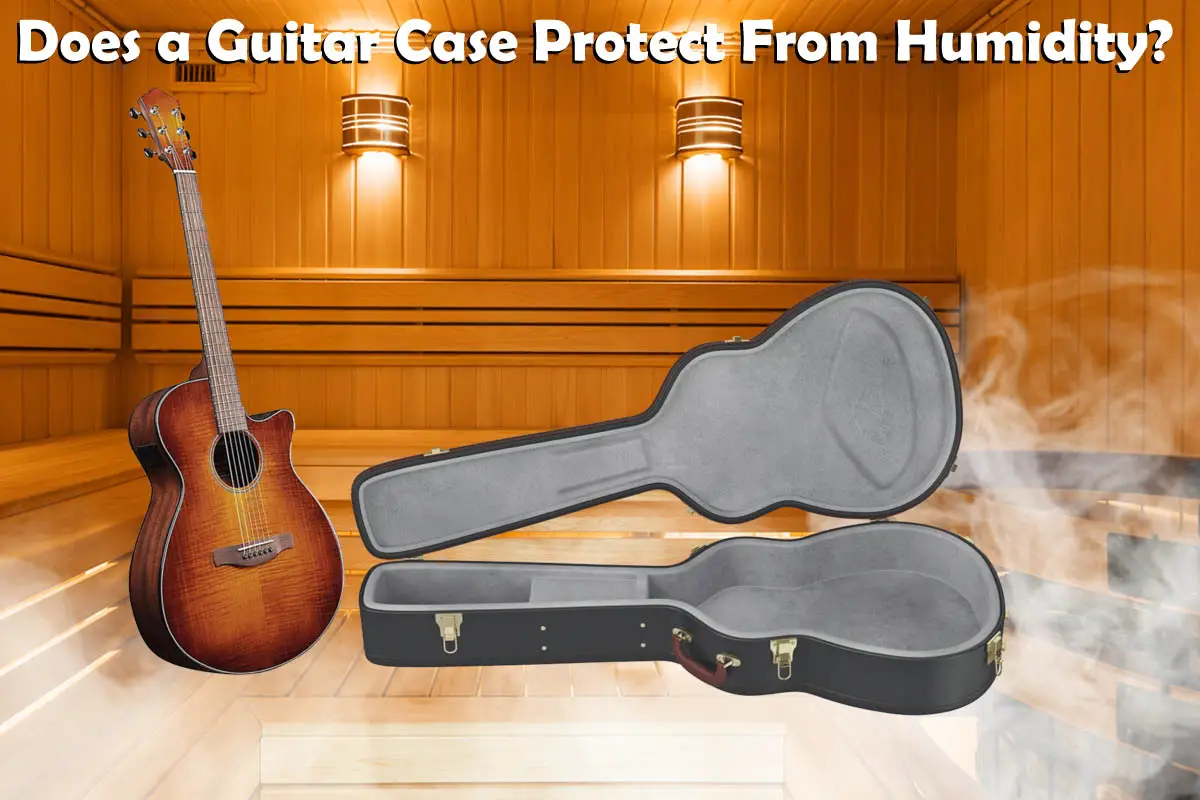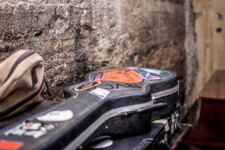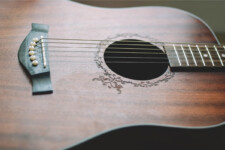Does a Guitar Case Protect From Humidity? (Storage Tips)
You probably know already that humidity can destroy a guitar, and is more likely to wreak havoc on an acoustic guitar than an electric.
Storing your guitar in a case offers it much more protection than just leaving it out, but how well does it really protect your guitar from the weather?
Soft cases are great for being a lightweight way to keep dust and rain off your guitar, but won’t be as effective as hard cases which offer better humidity protection. Plywood hard cases offer better protection, but the best humidity protection is with ABS plastic cases.
Most guitar cases won’t fully protect your guitar from heat or changes in humidity, and it can depend on where you store your guitar in its case, and how long you store it for.

Guitar Case Types: Their Ability to Protect From Humidity
The ideal moisture level for any guitar is around 40-50% humidity as a rough guide, and going far out of this range toward wetter or dryer conditions can damage your guitar.
Not all cases protect to the same degree, and it’s going to be obvious to you that soft cases just aren’t going to offer good protection.
Soft Cases
If a soft case gets wet on the outside (particularly fabric ones), the moisture will soak through to the inside and create humid conditions inside, and this can happen rapidly.
A soft case does little to protect your guitar from a loss of moisture when the air is too dry around it.
Really, soft cases are intended for short-term storage to keep dust and dirt off guitars, and aren’t a good option for more expensive guitars.
Hard Cases
There is more than one type of hard case, but in general they offer much better humidity protection than soft cases, but can still allow humidity damage to occur.
Hard cases are normally not completely sealed, and since the wood in guitars absorbs or loses moisture to match the outside air, give it long enough in a hard case and you can still have problems.
Although hard cases are not fail-safe, they do slow down the change of humidity inside, and will do a good job of protecting your guitar against rapid changes in temperature and humidity.
So if you are moving your guitar on a wet day to a heated dry room somewhere else, the hard case will be great protection from the change in humidity.
Guitar Case Materials: How Well They Protect From Humidity
Fabric and Vinyl Soft Cases
Soft cases are normally made from materials like fabric-lined vinyl, or foam-padded nylon material. These do very little to control temperature and humidity inside, and are better at protecting from small bumps and scratches.
Gigbags are usually better quality soft cases, but they are made from the same materials and are not intended for long-term storage, but rather for one night stands!
Some soft cases are made with water-resistant materials, but you will still get moisture seeping in at the zipper.
Plywood Hard Cases
Many guitar hard cases are still made from plywood with a covering like Tolex or Leatherette, which are basically a fabric backing with vinyl or another plastic bonded to the top.
While this type of covering is water resistant, it is not waterproof, meaning that moisture can still slowly find its way through.
You can store a guitar for longer in one of these cases than a soft case since the humidity inside will take much longer to change, but over time it will change to match the conditions outside the case.
Also the plywood itself will absorb moisture, and if it becomes too wet could create its own micro-humid climate inside the case that will take longer to dry out.
Just remember, if it takes a long time to become humid inside, then it will also take a long time to dry out, so with these cases it’s still best to open them every few weeks to air them out.
ABS Plastic Hard Cases
ABS cases are made from waterproof plastic, and offer the best protection against humidity changes inside. This being said, most cases have aluminum frames where they close, and this is not an airtight seal.
These cases really slow down the change of humidity inside the case, but won’t slow down the change in temperature as much as a plywood case.
Keep these cases stored in an area away from excess moisture and out of the sun, and you have a really good level of protection for your guitar, but you should still check inside every month or two.
ABS Plastic Waterproof Cases
These cases are often known as flight cases, and have a much thicker ABS plastic construction with a rubber seal on the lid.
These cases will offer the greatest level of humidity protection, and being airtight will prevent your guitar changing in moisture content inside.
Just keep in mind that if your guitar was in a climate that was too dry or too wet before you put it in the case, it will remain in this state when sealed inside the case.
How To Monitor Guitar Case Humidity
Honestly, the last thing you want is to put your guitar away safely in its case only to open it six months down the track and find a major problem.
Even with the best cases, if your guitar is important to you it’s a good idea to monitor the humidity inside the case.
There are two ways to monitor the humidity, and it might depend on your budget or number of guitars on which method you pick.
Inside the Case
The best and most accurate way to monitor the humidity is directly inside the guitar case itself with a hygrometer.
Digital hygrometers can be more accurate, and some models have a bluetooth connection so you can monitor the humidity inside your guitar case from your cell phone.
Most models have a display that can only be read by opening your case, however are cheaper.
Outside the Case
If you have many cases to monitor but keep them all in the same room, then it could make more sense to simply monitor the room itself with an accurate digital hygrometer.
Even if you keep a hygrometer in each case, an indoor monitor can quickly alert you when there is a change in humidity and temperature.
How To Protect Your Guitar From Humidity In Its Case
When seasons change and you use heating or cooling in your home, or take your guitar on a flight, humidity can vary greatly and a humidipack or dehumidifier can be a great safeguard to have inside your guitar case.
You can put a small humidification system inside your guitar case to help control humidity, however most of them only add humidity when it is needed.
A humidifier will add moisture to the air inside the case, while a dehumidifier will remove moisture. If you are using a humidifier, make sure that it is clean and free of bacteria, and you should also regularly check the water level and refill as needed.
Although most systems only work to make your guitar wetter or dryer, there are some that will automatically control the moisture content within the safe range needed for your guitar.
These systems are a little more expensive, however can raise or lower humidity in your guitar case as needed, giving you maximum protection.




